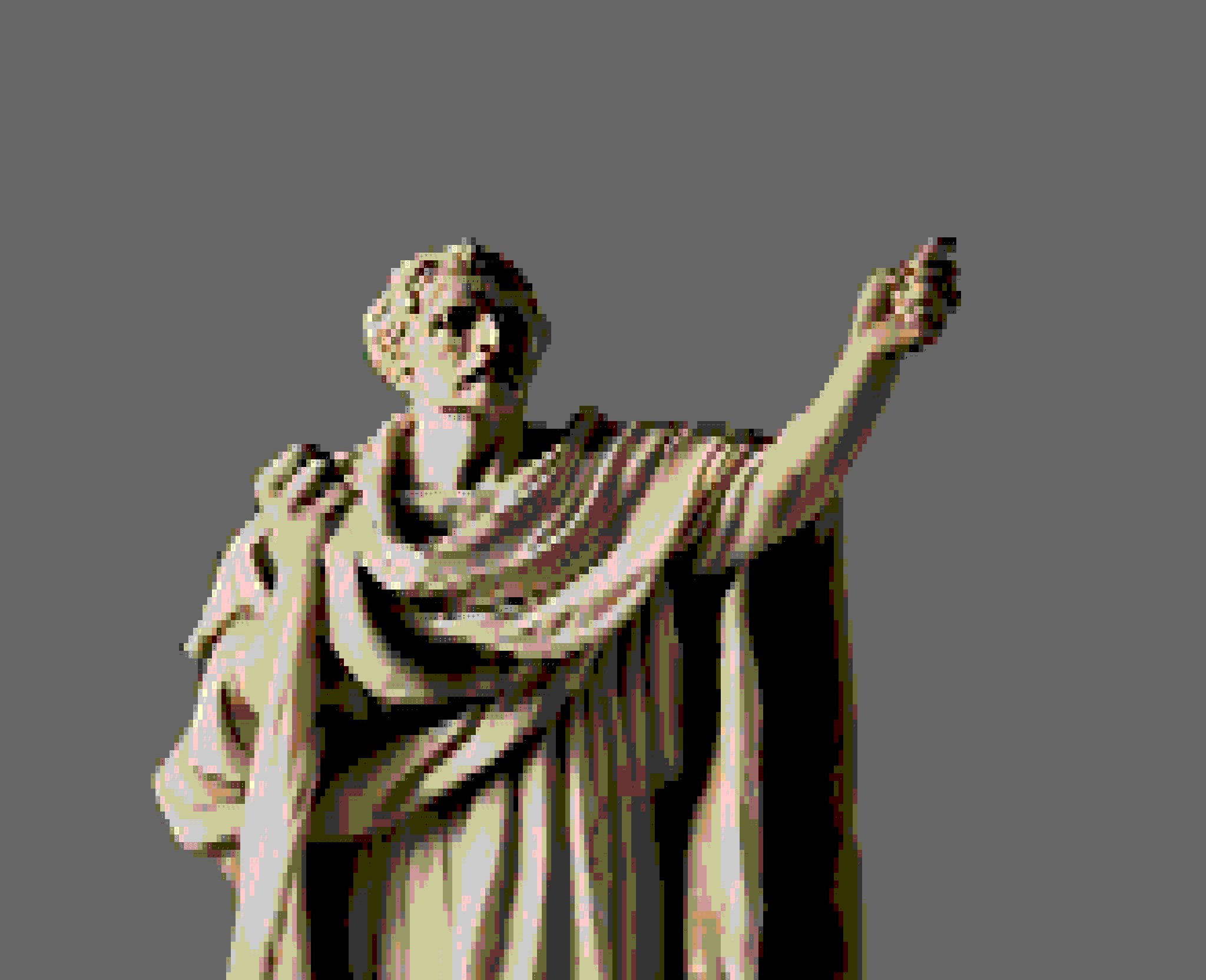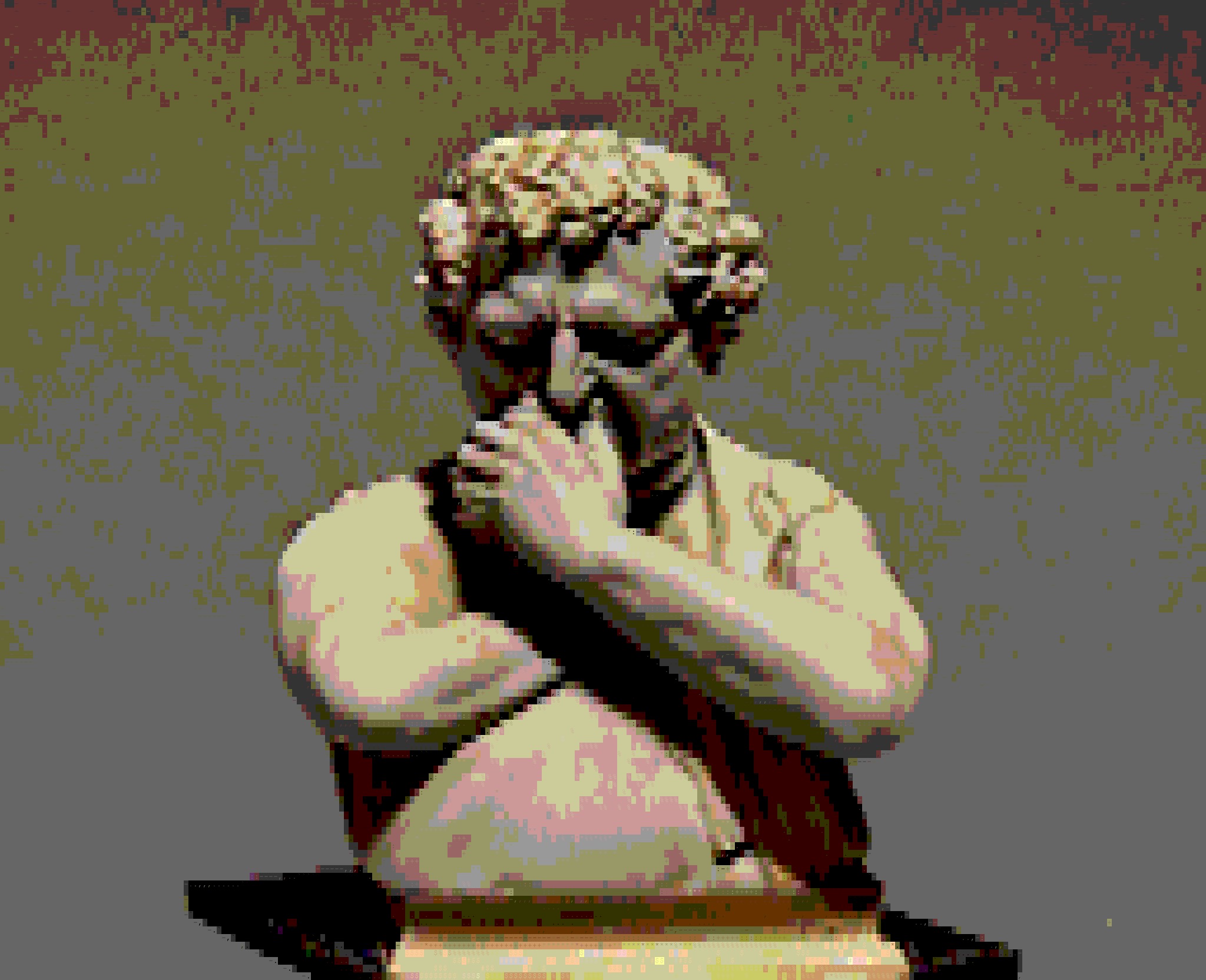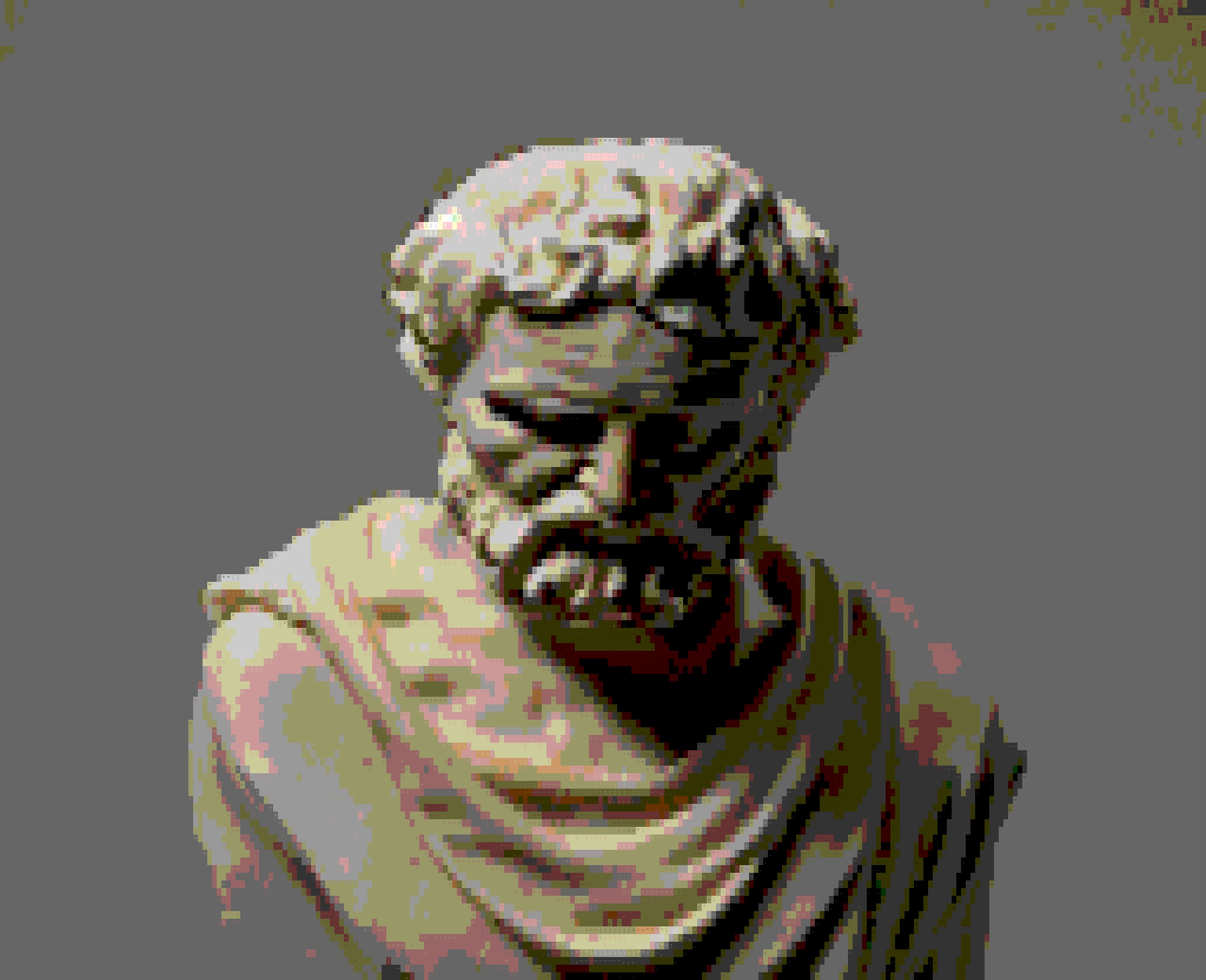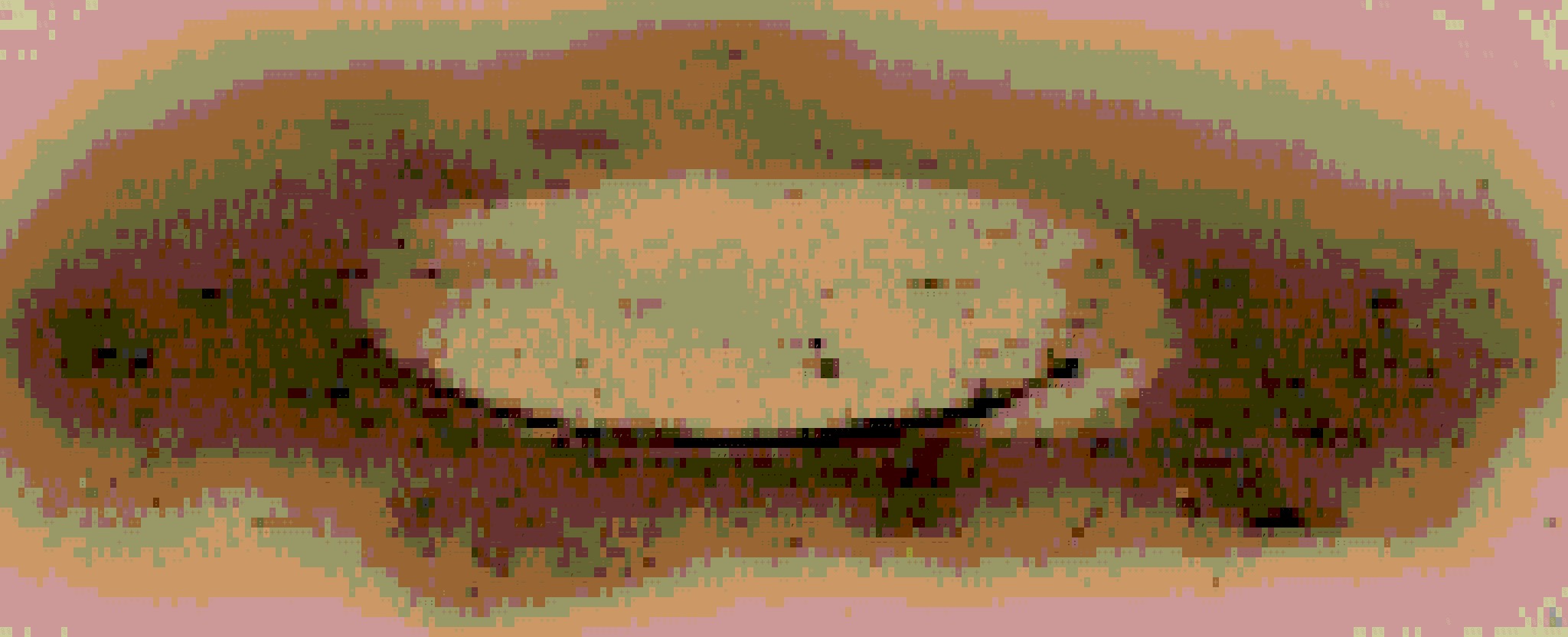views expressed dated: 2023-10, though they aren't really views, just me playing around...
Building a Cabin: Dialogues on the Foundations of Mathematics
There is one concept that corrupts and deranges the others. I speak not of Evil, whose limited domain is Ethics; I refer to the Infinite.
— Jorge Luis Borges
Mathematics, rightly viewed, possesses not only truth, but supreme beauty—a beauty cold and austere, like that of sculpture, without appeal to any part of our weaker nature, without the gorgeous trappings of painting or music, yet sublimely pure, and capable of a stern perfection such as only the greatest art can show.
— Bertrand Russell
Day One: Truth and Truth Makers
Somewhere in the not-too-remote wilderness of an undisclosed mountain range, Skepticus and Bloviatius assist Mundanius in building his dream-cabin. The day is wearing on and fatigue sets in, but there are a few more things to get done.
Skepticus, and Bloviatius stand impatiently as Mundanius taps his head with a pencil. He pours over the sweat-stained hand drawn blueprints, perhaps only intelligible to him at this point.
I don't see why we have to do all this without any power tools and without computerized blueprints.


Just let me see here...
I don't think these joists are the right size. Did you account for the width of the inside trim?


Give me a moment...
Mundanius furiously scribbles on his crumpled blueprints.
Bloviatius rolls his eyes and turns on his foot out of shear frustration.
Oh this is ridiculous! If you would have used the design software I showed you, we would be done by now and could be on to relaxing for the evening!


I've told you. If I do the calculations then I know they are right! How can I guarantee that your Auto-whatever program won't garble the numbers and have us waste time, money, lumber and hard work!
We just need to add one more bracing board here... Or was it the other side?
Why would the software be less trustworthy than this nonsense!

Skepticus gestures to Mundanius's crumpled set of blueprints.
We should be more certain that the software has got it right than these scribbles you have there.
Don't you suppose the same calculations are done behind the scenes in the software?

Appearing to not have been listening at all, Mundanius looks up from his blueprints to the place where the board needs to be placed to stabilize the scaffolded structure so their work can be finished for the day.

Aha! I see. I just made a mistake here referencing my diagram. The math is always right! I just picked the wrong board.
Begrudgingly, Skepticus and Blovatius follow his lead and began the necessary work to reach the day's stopping point.
A few moments later, they all kick back on the half-complete porch to watch the sunset and unwind after a hard day's work.
Bloviatius strokes his beard, looking at the stacked boards apparently in deep thought.
I was thinking about what Mundanius said earlier. Isn't it remarkable, the ability of mathematics to tell us about reality? I mean it's practically a miracle.

I'm not sure what you mean 'tell us about reality'.

Well it's just that. As he said "the math is never wrong". He presumably did some calculations with the Pythagorean theorem and the board bracing the roof is guaranteed to fit!


And that surprises you?
Well, isn't it possible that he did the calculations and it didn't fit?


Isn't that just called "doing the calculations wrong"?
I agree with Skepticus. Here, I think. Wait, what exactly are you saying?

So, we could imagine that he goes through the calculations, checks them, checks them again, proves their result, measures the board, and then it doesn't fit to complete the triangle. Is that what you mean by 'tell us about reality'?

Yes! I see. If he did so, and the board still did not fit, then I would not be so astounded at the efficacy of mathematics!


That's dumb. You would be more astounded because that is impossible. I don't think that I am correctly cutting, measuring, or using the Pythagorean theorem if the board does not come out to be the right size! There's no miracle here. Just a simple rule that we follow.
I think you are missing the point. I'll grant that it can be construed as a rule, but why is your rule correct about reality? In other words, why is there a rule that works that way at all?
Look, every true proposition must to have some thing that makes it true, right? A truth-maker.


I don't see where you are going, but I'm on board, I guess.
So what makes the Pythagorean theorem true? We all know that it is true, but why is it true?


I mean it works!
Surely you cannot say that it is true just because it 'works'? If we say that then anything that 'works' is true and 'works' is relative to a given goal --


You're right. I guess I believe it is true, if I must explain, because it follows from other self-evident propositions directly. Like I was sort of saying before, if you 'get it wrong' you just aren't following the rules of the 'math game' and so it really isn't surprising that math is 'correct about reality'!
So you think its just rules all the way down? If it's really just rules, then how come there are things like the
Millennium Prize Problems?
How can it be that its all rules, the rules are made by us, and yet we can't work them out.


I see no issue there. I think you are just underestimating the power of a structured rule system. Imagine that some guy invented Chess. He wrote the whole rulebook. Do we expect him to be able to beat Magnus Carlsen?
I don't expect you to beat Magnus Carlsen.


...
I don't think I am persuaded by this analogy of mathematics to Chess. Chess fundamentally lacks the applicability of mathematics. You can say it is a 'rule system' all you want, but that doesn't explain how it allows me to successfully interface with the world!

I think he's right, Mundanius. If I just invented a new rule system called "Schmathematics", would that just come with applicability baked in? I don't think "Schmathematics" would be guaranteed to be of any use. Like chess, it would just be an arbitrary rule system.
Axiom one of "Schmathematics"...


Alright, alright!
I do actually disagree though. Mathematics is a special kind of rule system because it has 'open variables' that apply to broad classes of things. For example, the Pythagorean theorem applies to ANY three 'things' that are lines and form a right-triangle. So, the boards in our example just 'stand-in' like the bishop 'stands-in' for the 'thing that is subject to the set of 'bishop-rules'.
I'm not completely satisfied with that. I think you are just dodging the question.
How do you explain that when things 'stand-in' for an open variable in the rules of mathematics, they have applicability, but not when we substitute those same things into chess or Skepticus's "Schmathematics"?
There is another quandary for your account. How does just adhering to rules guarantee that your method generates truth? What if it starts generating falsehoods?
So, the one problem is that it doesn't guarantee 'applicability' and the other is that it doesn't guarantee 'truth'. I'm not satisfied with that.


Are you really worried about mathematics all of a sudden generating falsehoods? What would that even look like?
I guess I would argue, regarding the 'standing-in' thing, that mathematics is just about the most general rule system we have, and so it makes sense that it's applicable because it is general.
Wait a moment. If you are saying it is 'general', are you not back-pedalling on it being 'rules we made up', a fabrication?
How could we think 'wow these rules sure are telling us the truth' and also 'let's make up another one. Oh! It looks like that one is applicable too!' without acknowledging that it isn't our following them that makes them true or without acknowledging an astounding coincidence.
So, if the 'rules follow from rules follow from rules' and so on, then at some point our initial 'general rule(s)', as you'd have it, must have had some property that made the rules that followed from that one true and applicable?


Right, but I don't see what the big deal is there. I think it's a rule system that unfolds from very general assumptions and what you are calling a 'coincidence', namely that the subsequent rules happen to stay or become applicable, is just our unwillingness to adhere to rules that don't work out. You mistake the rules of the game guiding our behavior for coherence to some deeper reality, whatever that means.
You act as if all of mathematics follows from some magical and minimal set of assumptions. I am more pluralistic than that.
Let's say I draw a circle in the dirt here.
Mundanius draws a circle in the dirt with a nearby stick

Now, I know that
A = π * r2, right? Let's assume we never knew how to get the circumference of a circle or do algebra.
I am the first person to move some things around and show you
C = 2π * r. I show you some graphical or algebraic proof and you believe me.
If you followed my proof exactly, by some rule, and it turned out that it was NOT 'applying' to circumferences generally, we just wouldn't play by that rule.
Bloviatius ponders the circle in the dirt for a moment as if looking more intently at it might solve the philosophical puzzle.
I can think of a third problem as well for your account, Mundanius. If it is just rules, then don't you need some quasi-mathematical assumptions to even follow those rules in the first place?
In your circle example, don't you need to follow rules in the first place to get to 'algebra' and thereby 'circumference'? Are you saying we are sort of 'empirically testing' those rules when we 'try them out' to be the first to find circumference?


Maybe not exactly 'empirically', but yes that's what I am saying.
So we make up the rules but we still 'discover' mathematical truths?


It's a discovery in the sense in this sense 'hey guys, I found some rules about circles that are convincing and fit with everything else we know about them'.
In general, I think it is a complex phenomena the 'emergence' of mathematics from human made rules-systems, but ultimately I think that is all it is. All of this excitement about deeper truths I think is just a confusion.
Almost standing up from his chair, Bloviatius looks up from the circle in excitement!
We've heard enough of man-made 'rules' in an attempt to explain the unshakable truths of mathematics! I believe mathematical truths are true because they are true of real mathematical objects!

Like what? What's a 'real mathematical object'?
I think the only real mathematical objects are the ones we apply our empirical theories to. I guess I am still with Mundanius on the idea that we have ideas with 'open variables' that apply to general classes of things. To my knowledge, the only things that can go in there are physical things. What alternative are you suggesting?

Real mathematical objects are abstract entities like 'sets' and 'numbers', of course!

And where are they? In some ghostly realm I can't apprehend with my senses? This seems like a very bloated theory if it is going to add the quasi-existence of all kinds of 'abstract entities'.

There is no quasi-existence! These mathematical objects exist independent of the physical world, but they exist in the very full-blooded sense that you and I do.


Hogwash!
Right... and how exactly have you come to know that?

Chortle away, but I have challenges for each of you that will make you second guess your ridicule of my position.
Mundanius, you claim that rules make mathematical truths true and Skepticus, you claim mathematical truths have their truth-makers in empirical reality.
How can either of you you account for the existence of actual infinities in contrast with the existence of merely potential infinities?
Also, I am sure you both would agree that these truths are necessarily true and true in all possible worlds! How can that completely explain their truth? Even if you claim that some feature of the mind or some set of rules makes them obtain, surely there is a possible world in which our minds do not have those features or where the rules were different? Then are the truths of mathematics false in that world!?
My position elegantly handles both of these difficulties that you seem to have overlooked!


Why are you so convinced that 'actual infinities' must exist? Seems like you are begging the question here.
A line is made up of an infinite number of points. True or false?


True.
And a plane is comprised of an infinite number of lines, a volume of an infinite number of planes, a hypervolume of an infinite number of volumes --


I get it. True.
So do you not agree that "There exists at least one thing such that that thing is a line", where line is sufficient for a "thing having an infinite number of points"?


Yes. But I don't think I take "There exist lines" to have the same sense of "exist" as you do. I could go on, hypothetically, in an infinite series. I just don't. That doesn't mean it has to exist. I could build three billion cabins, that doesn't mean that I am committed to the existence of two billion, nine hundred ninety-nine million, nine hundred ninety-nine thousand, nine hundred ninety-nine imaginary cabins.
Well the existence of 'possible objects' vs 'actual objects' is different from the ontological status of abstract mathematical entities.
If you use something in your theory or calculations you are ontologically committed to its existence. You claim there are infinities but deny they exist! Surely that is a contradictory position!


Like I said, I don't think "Exists" only has one sense like you seem to. Superman "exists", but as a fictional character. Numbers or lines or whatever "exist", but that just means that we use those concepts.
We don't need some fancy schmancy "abstract reality" to explain that. I think you are just overcomplicating things here by being weirdly strict with words.
We are going to have to agree to disagree for now on there being different sense of "exists".
That still leaves the problems of universality and necessity though!


Those seem like more of a problem for Skepticus than me. It doesn't matter what world I am in. If we agree to play chess the rules are the rules or we aren't playing chess anymore, we're playing something else. That handles your 'necessity' and 'universality'.
I think that leaves you in a position still of describing why your rules seem to apply generally again.

Mundanius casts a sidelong grumpy glance at Bloviatius who takes the signal to move his argumentative focus elsewhere.

I'm not convinced we need your "abstract objects", but I'll think more about it.
The evening has gone on into twilight. In the momentary silence they all suddenly notice the as yet ignored hum of insects in the surrounding forest. Skepticus breaks the silence.
I have a problem with this whole account Bloviatius.
Suppose there is some ghostly realm of 'abstract objects' whose existence the propositions of mathematics depend on in some way. Suppose that that is what makes mathematical truths true. All of it.
Are these things physical?

Clearly not.

Then how could you come to have knowledge of them? That seems odd to me.
Supposedly, knowledge comes from the senses or from reason! Pure reason alone could not guarantee our interaction with these mathematical objects or it would be the reason and not the objects that made them true!
So, it must be experience, but I fail to see how a 'non-physical' entity can be learned of from experience.

Well we cannot perhaps directly be acquainted with them but we can nevertheless have knowledge of them through the special faculty of intuition.

Uh huh...

I see you are unconvinced. I am sure though that you will agree to the following:
You can know that a "circle has only one side" without checking any circular objects, right?

Sure.

And you would also agree that "circle" refers to something, right?
And you would presumably agree that while no real circular thing must be perfectly round, a circle is. What we refer to when we talk about circles are ideal! They cannot be 'circles in reality' to truly have the properties we claim they have. So some perfectly circular thing must be the referent of our concept of circles, which I argue is the abstract object 'circle'!

I think it only refers to the collection of sense-experience I have surrounding circles, abstracted to some general theory which can apply to all of those 'circular things' and 'circular things in the future'. This theory is confirmed again and again by calculations I do on real world things.

But then we are right back at the problems of necessity and universality! The same problem exists for your theory regarding infinities!
If you say they are merely 'collections of experiences' then that does not explain the existence of 'actual infinities' or explain why mathematical truths would be true 'in all possible worlds'!

I think I am with Mundanius on the infinities, like he was sa--

Mundanius's head is slumped forward and he appears to have been asleep for several minutes. He lets out a sleep-addled mumble.
Skepticus carries on slightly quieter, but still intent on making his point.
-- like he was saying, I think we learn rules as
N+1 rules that we have no reason to believe would fail us.
Regarding universality and necessity, I can just claim that mathematics just
is contingent, but that is it just
less contingent than other stuff.

They carry on in heated whispers:
I see your point about
N+1 rules, but I think that's a bit weaker than the necessary existence of a whole infinite set.
Claiming mathematics to be contingent is surely absurd though!

Perhaps it is contingent on features of the mind for it to emerge. I would say that mathematics is contingently true impartially, and that it is necessarily true for any mind that comprehends logic. I have thought that logic must be the only possible basis for mathematics to be true in conjunction with experience.

I think both of those claims are ridiculous!
First, I wholeheartedly disagree with the 'contingency' of mathematics. That is unimaginable! Second, Gödel's proof shows that mathematics is not reducible to logic for any system that can do basic arithmetic.

I don't know much about Gödel, but whatever the standing of the contingency of mathematics, that seems more intuitively obvious to me than some magical realm of "numbers and lines" than you cannot explain how you have knowledge about!
You may have the elegant solutions, but it seems only at the cost of a bloated ontology!

I do not believe that our knowledge of abstract objects is as strange as you allege! We can come to know mathematical truths through the power of intuition. There is something about the human mind that allows us to grasp fundamental and non-physical truths about reality!
You cannot explain as well how the truths of mathematics are true without a theory like mine! Mathematics would have no stable foundation!

I believe it is enough that they bolster our empirical theories for them to be foundational.

That is no foundation at all! How can you really know they are true in the sense that you take them to be without first establishing the foundation.

Mundanius, now awaking, impatiently claps his hands to his knees and looks at both Skepticus and Bloviatius. It is time for bed. They all have grown weary working and arguing. No minds have been changed and no meta-mathematical truths have been undeniably asserted. There is only the foundation, for now, of a small cabin and future conversations.
Each of our philosophers seem to take a slightly different view on what makes mathematical truths true. Mundanius takes a deflationary account, Skepticus a hard-lined empiricist one, and Bloviatius the Platonist account. I myself tend to side with Mundanius, although I feel the pull of the other views on some issues.
Much more could be said on the foundations of mathematics, whether there is an epistemic need for one, the nature of the infinite, and what exactly mathematics is. For now, we will adjourn with our tired friends.



















































































